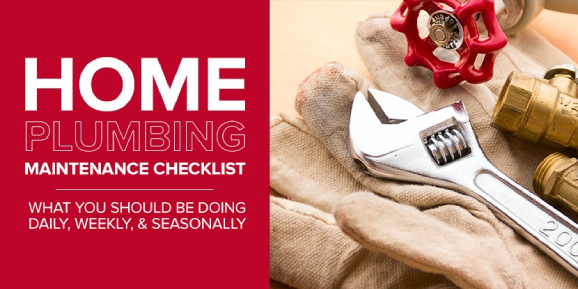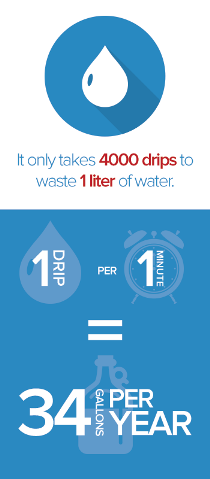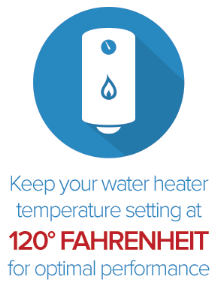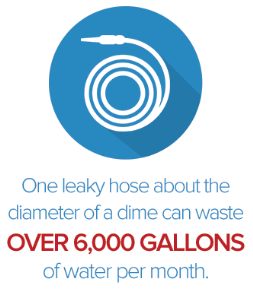 Did you know your home plumbing system makes up about 15 percent of your total home value? That’s quite an investment!
Did you know your home plumbing system makes up about 15 percent of your total home value? That’s quite an investment!
A smoothly operating, efficient plumbing system enables you to have clean, fresh water as close as your faucet and warm water to keep your home and your family clean. Properly functioning plumbing systems have other benefits as well:
- Access to clean water is essential to good health, hygiene and well-being.
- Home plumbing systems add convenience to modern living.
- Modern plumbing can help communities in times of water shortages and drought.
- Water-saving devices increase water efficiency and your home’s energy savings.
As a homeowner, you need to protect your investment. That means maintaining your entire home, which includes the plumbing system you rely on every day to do your household chores and other tasks.
Home Plumbing Maintenance Checklist
.webp)
Why Worry About Plumbing Maintenance?
Taking care of your home’s plumbing is essential to keeping the clean water flowing in and flushing your home’s waste out. Most people don’t think about their plumbing until a problem arises. By then, however, they are left with a huge mess and, ultimately, a large bill.
This can be avoided. Plumbing maintenance is something you should do regularly to catch small problems that can turn into large, expense problems later. Maintenance also helps you conserve water and save on energy bills.
Not only could faulty-working plumbing parts cause more expensive issues later, they can waste money in the meantime. One small leak can waste a lot of water. As the water comes out drip by drip, it adds up. It only takes 4,000 drips to waste one liter of water. One drip per minute from just one faucet in your home adds up to about 1, 440 drips per day and 34 gallons per year!
Maintaining your home’s plumbing system means checking for small leaks periodically. It also involves performing some seasonal plumbing maintenance to catch problems and repair them as soon as possible. With seasonal plumbing maintenance, you should be inspecting and maintaining your septic system, as well as servicing your water-using appliances — water heaters, washing machine and dishwasher.
Plumbing leaks not only affect your pipes and water pressure, but they can also cause damage to your home. A leak that goes undetected under a sink or in a wall can lead to wood rot, mold growth and pipe corrosion. Repairing the long-term damage caused by a small leak is costly and an even bigger headache for you due to the inconvenience it may cause.
If a pipe freezes and burst, you could be dealing with a flooded room. Water absorbed by carpeting must be vacuumed out and the area must be dried out quickly to prevent mold and mildew from taking over.
The best way to avoid plumbing problems, keep energy costs down and conserve water for future generations is to make sure your home’s plumbing system is working properly. If a problem occurs, you need to deal with it immediately.
In this article, you’ll find a plumbing maintenance checklist that includes daily tips, weekly inspections and maintenance for each season. By following this checklist, you can save on energy costs, conserve water and keep your home plumbing system running properly.
Daily Maintenance Tips
What you do daily can affect your plumbing. Daily maintenance includes preventing clogs, which are one of the most common plumbing issues homeowners face.
Why worry about clogged drains? Clogs are not only nuisances, they also shorten the lifespan of your waste pipes by adding extra pressure and added stress. Even a slow drain can cause problems, so it’s best to get a clog cleared before it becomes a complete blockage. Better yet, prevent blockages in the first place.
You use your home plumbing daily, so you need to care for it daily. But how? You can do so by following a few simple plumbing maintenance tips to keep your water moving through your pipes and waste exiting your home. The bathroom and kitchen are the two rooms in your home that supply the most water and are at the highest risk of developing plumbing issues.
In the Kitchen
Kitchen drains often clog due to debris or wastes going down the sink that shouldn’t. To prevent clogged drains in this room, never put grease or oils down the sink. This includes cooking oils and fats, such as butter, that can congeal in the pipes, blocking water flow.
Improper use of the garbage disposal is another common reason for clogged kitchen drains. Follow this kitchen plumbing maintenance checklist to help you avoid this problem:
- Always turn your water and disposal on before adding food.
- Never put fibrous or stringy food wastes down the disposal. These include banana peels, celery, potato peels, and other foods that are difficult to grind up.
- Always allow the cold water to run for at least 15 seconds after using the disposal. This ensures food wastes are flushed down the main line.
- Run your dishwasher at night to conserve hot water and maintain good water pressure throughout the day.
In the Bathroom
The bathroom is another room where drains often become clogged. You can reduce clogs and even prevent them by following this plumbing maintenance checklist:
- Keep shower and sink drains flowing freely by reducing your use of bath oils and installing screens over drains to prevent hair from going down the drain.
- Avoid toilet clogs by not using it as a trash can. Ideally, only human waste and toilet paper should be flushed. While tampons and some wipes are labeled as flushable, it is better not to do so.
- Wait about 10 minutes between showers to help maintain proper water pressure and hot water throughout the day. Maintaining proper water pressure helps prevent unwanted stress on your home plumbing system.
- Avoid using chemical clog removal products that can cause more harm than good. These products can corrode your pipes!
Think of all the products you use to wash, moisturize and condition. They are often oily or greasy in order to provide moisture for your skin and hair. Once they make their way down your drain, however, they can cling to pipes, attract other debris and cause blockages.
Weekly Maintenance
Checking on your pipes once a week is great idea for all homeowners. This is good way to prevent small problems from becoming huge, costly ones. Some weekly plumbing maintenance includes the following:
- Check for leaks. Look under the sinks for signs of moisture, such as puddles of water, water marks, a musty smell and mold growth.
- Test all sink and shower drains for speed or drainage. If bubbles appear while water drains, it is usually a sign of a slow drain. All drains should have a full swirl while the water goes down.
- Turn on each water faucet in your home — water shouldn’t be coming out of the handles or valves.
- Clean your lint traps on your washing machine.

Small leaks can waste up to 1 trillion gallons of water a year nationwide. Leak detection isn’t too difficult if you know some of the most common places where leaks occur in your home’s plumbing system. These include:
- Pipe valves
- Faucets
- Worn toilet flappers
- Drippy shower heads
- Loose pipe fittings
All these are easily fixed by replacing fixtures. Usually, they don’t cost much, but they do prevent costly water bills overtime.
Seasonal Maintenance
The change of seasons can affect your plumbing. There are certain plumbing system maintenance steps you should take in the fall, winter, spring and summer.

During fall, leaves and temperatures begin to drop, giving you a subtle reminder that winter is just around the corner. This is the time to prepare your pipes for the cold winter days ahead.
Outdoors Spigots
Outdoor spigots and water hoses used during spring and summer should be prepared for hibernation. Follow this outdoor fall plumbing maintenance checklist to properly prepare for the cold days ahead:
- Disconnect your water hose from the outdoor spigot. If left connected, the hose can freeze, expand and cause connected indoor pipes to burst.
- Shut off the water valves for outdoor spigots — if you have them — and drain water from your outdoor water lines.
- Check outdoor faucets for drips and leaks. Call a plumber to make any necessary repairs before winter arrives.
- Cover all outdoor spigots using a Styrofoam insulation cover. You can find these at home improvement stores.
- Insulate pipes in unheated areas of the home, such as the garage and crawl spaces. Use heat tape around pipes that are prone to freezing.
Water Heater

- Keep your water heater temperature setting at 120° Fahrenheit for optimal performance.
- Flush out your water heater to remove any sediment. Sediment causes corrosion, reduces efficiency, and shortens your water heater’s life span.
- Test the water heater’s pressure release valve by lifting the lever and allowing it to snap back. If working properly, the valve should allow a burst of hot water into the drain pipe. Caution: Do not conduct this test on units that are five years old or older — consult a plumber in order to prevent causing a leak.
Gutter and Sump Pump Plumbing Maintenance
Two other important outdoor jobs include cleaning debris from gutters and inspecting and cleaning the sump pump. Gutters must remain free of debris so that water can drain easily as it freezes and thaws throughout the fall and winter. Sump pumps that are exposed to extremely cold temperatures can freeze and stop working. The sump pump and pit should be cleaned and inspected before cold winter weather arrives.

Frozen pipes are one of the biggest concerns for homeowners during winter. When water inside your pipes freezes, it expands, which causes pipes to burst under the pressure. Your main concern when it comes to winter plumbing maintenance is preventing your pipes from freezing.
Follow this winter plumbing maintenance tips checklist to avoid dealing with the headache of frozen pipes:
- Insulate both warm and cold water pipes, especially those located in areas vulnerable to freezing: crawl spaces and basement.
- Eliminate drafts in the home. Check areas near waters supplies, such as in kitchen and bathroom cabinets that house pipes and in the attic, garage and basement.
- Allow water to run from each valve in your home at regular intervals in winter to keep pipes from freezing.
If your indoor pipes are prone to freezing, or you have extremely cold weather, you can take precautionary steps to reduce the risk of freezing:
- Heat your entire home — not just certain rooms. Allowing warm air to circulate through your home keeps your pipes warm.
- Leave cabinet doors that house kitchen and bathroom pipes open to allow warm air inside.
- Allow the water to trickle from each faucet in your home when temperatures are extremely cold.
Your heating system must work properly to keep your home warm. If you don’t have it inspected and maintained, it can go out when temperatures are freezing. You can leave and stay in a warm home with family or at a hotel, but your pipes are left to freeze. Home plumbing maintenance is not only about your pipes — it’s also about maintaining the entire home.
What If Pipes Do Freeze?
If your pipes freeze during a cold snap, you can take certain steps to help reduce the amount of damage sustained:
- Turn off water at the shutoff valve for the pipes in that area.
- Leave the faucet on to relieve pressure as the pipes thaw.
- Use a hair dryer or heat gun to slowly thaw frozen pipes.
- Never use a torch or any other type of open flame to thaw pipes.
- If pipes burst or crack, call a plumber to replace them.
Everyone living or staying in your home should know where your shutoff valves are for water in different rooms of your home. They should also know where your main shutoff valve is to avoid flooding if pipes burst. If you don’t know where the shutoff valves are located, you can ask your local plumber for assistance in locating them.

Weather warms in spring, making homeowners anxious to start spring cleaning, inside and outside the home. It should also be a time for spring plumbing maintenance to avoid plumbing troubles later on.
Indoors
Drains are the key to effective indoor spring plumbing maintenance. You need to check all of your drains and make sure they are working properly. If you find a problem, contact a local plumber to fix it as soon as possible. Here are some maintenance tips to follow:
- Check for slow leaks around your home. You can do this by taking a water meter reading and avoid using your water for a couple of hours. After two hours, if the reading changes, you have a leak.
- Check all pipes in your home for signs of leaks, such as puddles or watermarks. Call a plumber if you need assistance.
- Check drains you don’t use often by pouring a gallon of water down them to fill the trap and prevent odors from entering your home. Any drains that are slow should be snaked.
- Check your water-using appliances — such as your washing machine and dishwasher — for cracked, bulging or otherwise worn hoses. Replace any worn hoses to prevent future leaks.
- Inspect your toilet bowl and tank for leaks. Add a few drops of food coloring to the toilet tank. If you notice color in the toilet bowl within 30 minutes, you have a leak.
Taking these small steps each spring can help you save money on water usage and prevent problems down the road. Replacing worn hoses on washing machines is a simple task and won’t cost you a lot of money. Checking for leaks doesn’t take up much of your time, but saves you plenty of time, money and headaches later on.
Outdoors
As temperatures warm in spring, birds build nests in various places, increasing the risk of floods when the snow thaws. This is the ideal time to perform some important outdoor plumbing maintenance.
Here is a checklist for outdoors:
- Clear gutters and downspouts of any bird nests.
- Check for bird nests built in plumbing vents.
- Turn on outdoor spigots to make sure they do not leak. If leaks or drips are detected, make sure to do repairs right away.

Summer is the ideal time to have your septic system inspected. The ground and temperatures are warm, making the plumber’s work easier. A blockage in your main sewer line or a sewer back up is a serious problem. Water from heavy storms can seep into cracks in your sewer system causing backups. You can prevent all these problems with regular plumbing maintenance.
Summer is also the time when you’ll be using your outdoor sprinkler systems. You want to ensure they are maintained as well.
Here’s your summer plumbing maintenance checklist:
- Have your septic system inspected regularly.
- Get your septic system pumped when needed — the right time for pumping can be determined during an inspection.
- Keep track of stoppages and times between them.
- Schedule regular sewer main snaking if tree roots cause regular problems regularly.
- Consider having trees with problem roots removed to avoid future plumbing problems.
- Clean embedded sprinkler system heads and make sure they work properly, so you don’t damage them while mowing the lawn.
If you use a lawn irrigation system, it should be checked for signs of damage and leakage before using it. You should also check your garden hoses for damage before using them. During winter hoses may crack or dry rot, leaving them vulnerable to leaks. While you can repair water hoses with patching material, if it is cracked in several places, buy a new hose. One leaky hose about the diameter of a dime can waste over 6,000 gallons of water a month.
Other summer water maintenance checklist duties include these landscaping tips:
- Raise your mower cutting height, so that grass blades are tall enough to shade the ground and use less water.
- Replace mulch under trees and around plants to help soil hold moisture.
- Remove weeds growing around plants — they compete with plants for moisture.
- Use fertilizers sparingly — fertilizers encourage new growth that requires more water.
Your home plumbing system not only supplies water for inside jobs, but it also provides water for outdoor work as well. For this reason, it is important to consider outdoor activities and water usage when conserving water and cutting energy costs.
How Local Plumbers Can Help
You don’t have to handle all of your plumbing inspections and repairs alone. Your local plumber is there to assist you in making sure your home plumbing system is running smoothly and efficiently. Turn to a plumber with any concerns or questions you may have. T hey can also provide some good ideas on how to save water usage and energy costs.
hey can also provide some good ideas on how to save water usage and energy costs.
Local plumbers, such as Mr. Rooter Plumbing of Greater Syracuse, can help you with all of your plumbing needs. Mr. Rooter Plumbing offers complete plumbing services for homeowners, including:
- Clearing clogged or slow drains.
- Repairing sinks and faucets.
- Repairing bathtubs and showers.
- Repairing leaky or corroded pipes.
- Installing, repairing and replacing water heaters.
- Repairing toilets.
- Servicing septic tanks, including installation, repair, pumping and inspection.
- Servicing underground plumbing.
- Inspecting pipes using latest video technology.
When You Don’t Know What’s Wrong
When you need assistance with water-related issues, contact our local plumbers to help you. Let’s look at how helpful a plumber can be when plumbing issues occur.
Mr. Rooter Plumbing can help when you’re not sure what’s wrong. You may know you have a leak, but can’t find it. You might want to upgrade to water-saving appliances or fixtures, but don’t know where to begin. Our licensed plumbers are certified by Onondaga County for plumbing leak detection or any plumbing related project.
- Call Mr. Rooter for plumbing diagnosis and checkups. Our plumbers inspect your entire home’s plumbing system, performing a preventative maintenance inspection to detect leaks, slow drains and other issues. We can also diagnosis the problems causing your leaks or blockages, so you can avoid future plumbing problems.
- Call Mr. Rooter for plumbing system cleaning and maintenance. Our plumbers offer HydroScrub® Drain Cleaning. This service uses a combination of water pressure and volume to keep your plumbing system clean — and even restore your old system to like-new condition.
When You’re Too Busy to Worry About Plumbing Maintenance
Mr. Rooter Plumbing can help you avoid a plumbing emergency with regular maintenance. While you may not have time to maintain your plumbing system, or you don’t want the extra expense, regular maintenance saves you both time and money in the long run.
When you work with our plumbers to set up a maintenance schedule, you can rest assured your home plumbing system will continue to work smoothly and efficiently. It will help you avoid inconvenient, costly plumbing issues in the future. Our plumbers can also discuss any installations or upgrades they believe are necessary to make your plumbing system more efficient.
When the Job Is Too Difficult for You to Do
Some home plumbing issues are easy to fix. Most do-it-yourselfers can replace pipes and fittings to stop leaks, replace parts on toilets or faucets, and other small jobs. Not everyone, however, can handle the more complex plumbing challenges.
How do you know if a job is too difficult for you? If you find yourself in any of the following situations, you should call a licensed plumber:
- If you don’t even know where to begin, don’t attempt it! Maybe you know what’s wrong, but you don’t know what steps are required to fix the problem. Maybe you know something is wrong, but you don’t know how to go about inspecting your system.
- Our licensed plumbers are trained to understand the entire plumbing system. They are better able to correctly diagnose and repair problems.
- The job requires tools you don’t have. While you can rent or buy tools, you shouldn’t do so unless you know how to use them correctly and safely.
- Mr. Rooter Plumbing has all the tools needed for all types of plumbing jobs. Our plumbers are also trained on how to use tools of the trade properly and safely.
- You get started on a project and other problems arise. If this happens, stop what you are doing and call Mr. Rooter Plumbing.
- Our licensed plumbers are trained to deal with other problems that may arise while working on a plumbing system. If something goes wrong, they can take the necessary steps to keep the situation from getting out of control.
- A job may pose hidden dangers. If you are working on plumbing inside walls or other places where pipes are hidden, there are dangers lurking you may not be aware of.
- Our licensed plumbers understand the hidden dangers they may face on the job and can perform repairs safely. They can also do their job without harming nearby walls, tiles or other pipes in their work area.
- You cannot warranty or guarantee your own plumbing work. If you want a guarantee or warranty on the work done, rely on professionals to do the job.
Mr. Rooter Plumbing offers guarantees on both parts and workmanship. Licensed plumbers know and adhere to all plumbing codes.
Why Call Mr. Rooter Plumbing?
With every service call you make to Mr. Rooter Plumbing, you benefits from:
- A complete plumbing checkup.
- Scheduled appointment times.
- Guaranteed workmanship and parts.
- Upfront pricing.
- NO charge for overtime.
- Appointments 24 hours a day, 7 days a week.
Don’t let your plumbing system go unchecked and without proper maintenance. Follow the checklist guidelines and, if you need help, contact Mr. Rooter Plumbing to set up an appointment. No matter what plumbing issue you have, our licensed plumbers are well-equipped to handle it.


